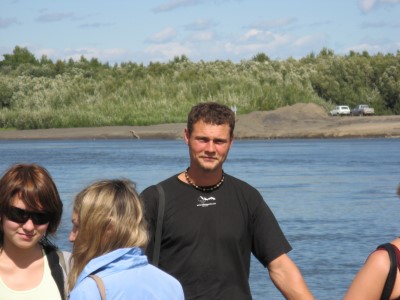
What a wonderful world
After
everything had been packed and stowed in
the boats, we set off to find the place for which Slava had given us
the
coordinates. It was on the other side of the river, but we couldn’t get
nearer
than 30m. We stopped on the nearest sandbank and waited. Three young
Russians
definitely wanted to start a conversation with us. Somehow,
communication is
always possible – even if only to a limited extent. When they heard
that we
were German, they told us that ‘Rammstein’ was their favourite rock
band. I
must admit that I had never even heard of this group
At
about 18 hrs, a man appeared on the opposite
bank and started to assemble a kayak. This was actually Slava, our
guide for
the remaining 320km of the river, to Ust-Kamchatsk, through a military
restricted area.
From the very first
minute, our fears about our guide proved unfounded.
Communication was no problem. Slava' s English is excellent - something
we could not say about our Russian.

He
asked us at once about how our boats had
capsized – He had heard about it from Martha.
We
spent the night on the sandbank opposite
Kozyrevsk. The next morning, after we had had breakfast, and after
everything
had been stowed in the boats again – Slava took some of our canoe-sacks
in his
boat – we set off.
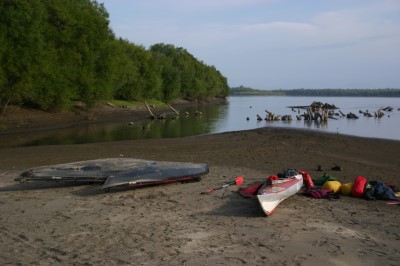
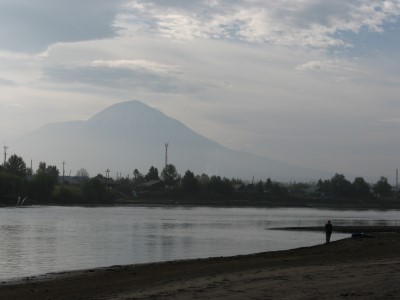
For
the first time, we were on our way but not
alone. However, after our experiences, we were not exactly sorry to
have
someone with us.
Here, the character of the river is very different to in the Milkovo area. The river has become wider and flows more slowly. So, after seven hours in the boats, we had travelled only about 40km. There were not only the tiny black mosquitos but also tiny white monsters, which did not sting but bit. Especially when it is getting dark, it is impossible without chemical protection and mosquito nets.
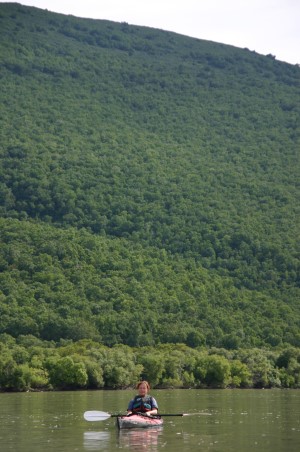
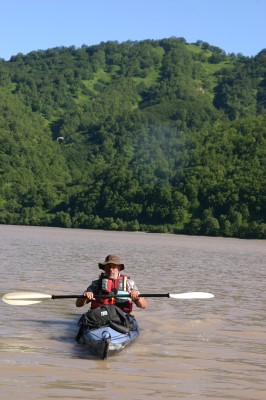
On
our second day, we could already see the
lower 4000m of Mount Kljutchevskoj (the upper part was hidden in mist).
It was
a fantastic view, which accompanied us the whole day. In the course of
the day,
the landscape changed several times and, at the end of the day, there
was a real
stretch across a lake for the kayaks. The river is so wide that the
wind can
raise real waves – it is a question of whether the wind is blowing with
or
against the river current.
On
the edge of the sandbank on which we pitched
our tents, we found the old tracks of bears. Slava told us that the
tracks must
have been made by a bear which was about 2.50m in size.
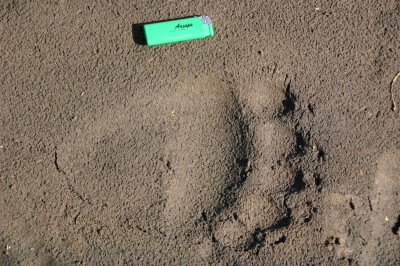
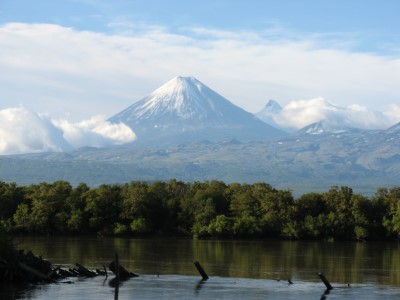
We
observed all the precautionary measures to
be taken when near bears, and the bears did not disturb our night rest.
The
view, when we crawled out of the tent the next morning, was fantastic.
A
brilliant blue sky and, in front of it, Mount Kljutchevskoj, in its
full size
and beauty – 4688M.
That
day, we needed three more hours to reach
Kljutchi. Some of the houses there are really pretty. They are
brightly-painted, with a well cared for front garden, nasturtiums in
the boxes
on the balconies, and hops on the balcony. In the fourth shop, we were
even
able to buy Muesli and nuts. Slava said that the inhabitants of
Kljutchi were
either members of the military, volcanologists, or fish poachers. Since
the
government started to pay its employees only sporadically – or not at
all, the
latter must be in the majority. But one has to have something to live
from.
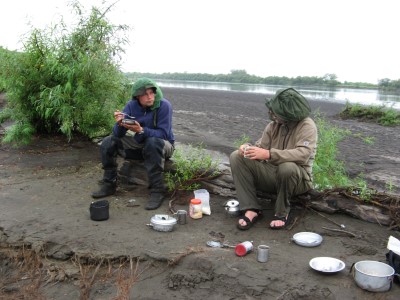
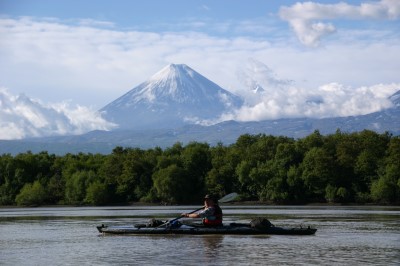
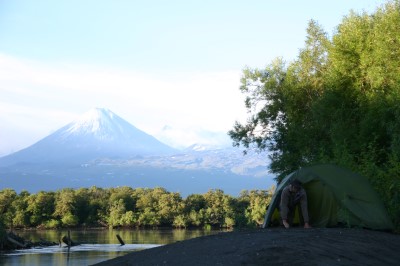
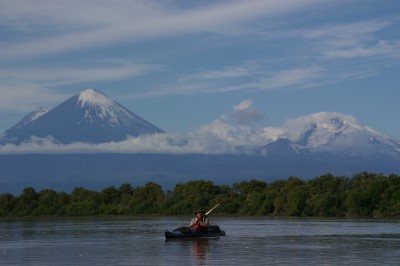
Just
after Kljutchi, the wind freshened considerably,
but this time it was from behind us. Although this meant that we were
faster,
it still took a lot of effort to remain on course as the current and
the waves
were superimposed. We came to a section where the Kamchatka was at
least 800m
wide – an enormous river. Again, we pitched our tents on a sandbank,
stowed our
gear, and I cook the evening meal.
The
day had started with a relatively strong
current but then we came to places where the river was very wide, and
there was
hardly any current. This was the section we had been warned about in
Milkovo.
Michail had told us that it was impossible to cross this section in a
kayak. He
also talked about white-water in this connection. But there was not a
sign of
white-water. It was a fantastic sight, with mountains on either side –
and we
glided through, silently, in our kayaks. Slava knew a fisher and hunter
here,
with whom we stayed for the night. On our arrival, we were first
greeted so
exuberantly by three dogs that Annette’s boat almost capsized as she
was
getting out. Vasilii let us use one of his huts. He told us that, in
this
section, the Kamchatka carried as much water as the Amazon. While we
were
talking, Slava was preparing fresh salmon for our evening meal. It was
a
delicious meal and we ate until our stomachs were full of salmon.
During the
night, the dogs made a hellish noise. The next morning, we found there
were
bears not far away. They also wanted some of the salmon.
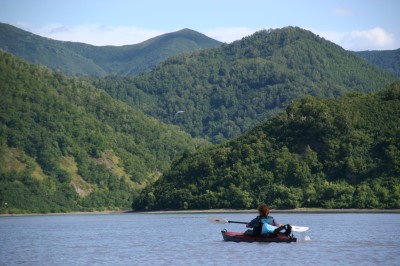
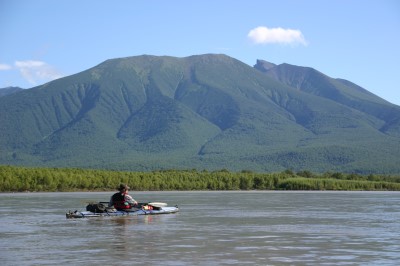
Bats
were hanging in the beams of Vasilii’s hut
and there were three soft, fluffy cats. Annette would have liked to
take one
with us. She said that, without passports but with a cute kitty, we
wouldn’t
have any problems getting out of Russia or back into Germany. But we
left the
cats there. I don’t think we could have persuaded them to come with us,
especially as Annette could not decide between the white and the
mouse-grey
cat.
An
old wooden church, built in 1703, was where
we were aiming for the next day. In the meantime, we had left the
mountains
behind us. The last stretch to the pier was upriver on a tributary of
the
Kamchatka. To finish the day off, we had to work really hard again
here. After
we had pulled the boats up out of the water, Slava went to look for the
priest
who looked after the old church and lived here. While he was doing
this, we
unloaded the boats. In the meantime, a motorboat came, bringing the
priest in
it. Unfortunately, Slava was not there, so we had to rely on our
knowledge of
Russian. That would not have been so bad but the pope (Russian priest)
thought
he could speak English. Unfortunately, this was far more difficult to
understand than Russian. When Slava returned, the pope complained to
him that
we didn’t understand his English.
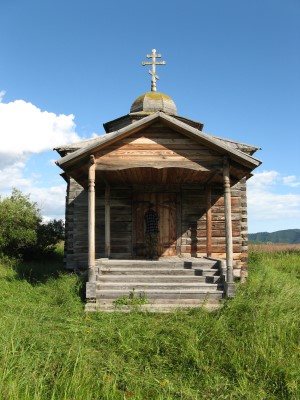
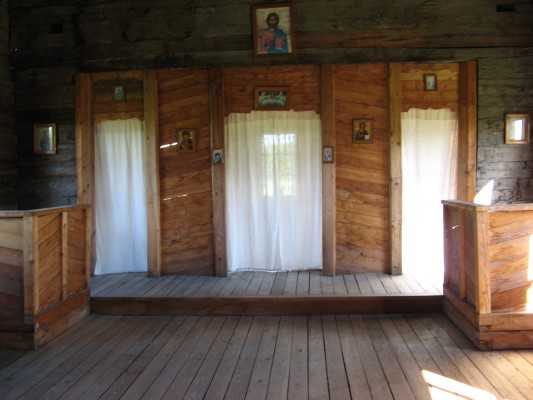
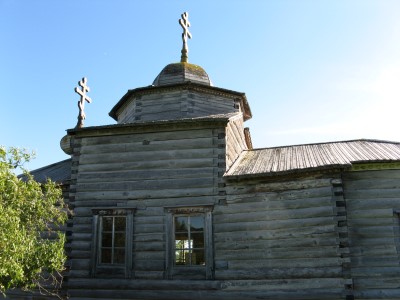
The
over 300 year old church is very simple but
it is beautiful, with lots of light inside.
Unfortunately,
when we wanted to leave the next
morning, Slava had forgotten his cigarettes and had to turn back. As
the
Kamchatka is very wide and sluggish here, waiting for him was no
problem.
Slava
had promised that there would be fewer
mosquitos that day. He was very wrong!! But that was the only mistake
that he
made. We pitched our tents in a meadow, just before we reached
Ust-Kamchatsk.
According to Slava, it was only two kilometres from here to the sea, so
we were
very near our goal. At midday, I wanted to avoid a sandbank on one side
of the
river but, unfortunately, I got stuck on a sandbank in the middle of
the river.
I had to get out, pull the boat into deeper water, and then get back
in.
Luckily, there was very little current.
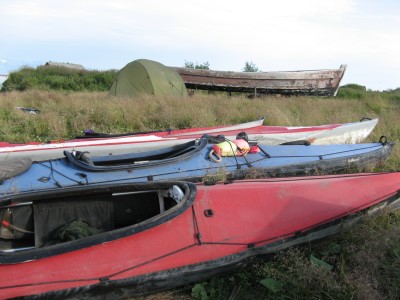
During
the last few kilometres of our stretch
for the day, we saw a few seals. We were amused by the way in which
they looked
at us with their big round eyes and then suddenly dived underwater.
The
last stage of our trip was rather exciting.
In the morning, we couldn’t see a hand in front of our eyes. In spite
of this,
we set off. At times, we could only determine Slava’s position by
calling. As
we went too far to the east in the fog, we finally had to carry the
heavy boats
over a sandbank and, by about midday, we were finally about where we
wanted to
be. We now had to take the boats apart and pack them quickly. Luckily,
our
transport was a bit late, so everything was packed when Slava’s friend
arrived
with his van.
On
arrival at the hotel, our missing passports
again caught up with us. Slava had to make another report for the
police
officer who arrived shortly after us. After reports for both Annette’s
passport
and mine had been drawn up and signed, that was the end of the matter
for the
time being. On our way across the restricted area, we had not been
controlled
once. In view of the detailed report which had to be made in the hotel,
that
was definitely just as well. Unfortunately, we had to give our FSB
permit for
the restricted area back to Dilgans before
we left.
Slava
managed to get tickets for the bus back
to Petropavlovsk for the next day. Without him, we wouldn’t have able
to get
them. That evening, we celebrated that we had reached our goal within
the
available time.
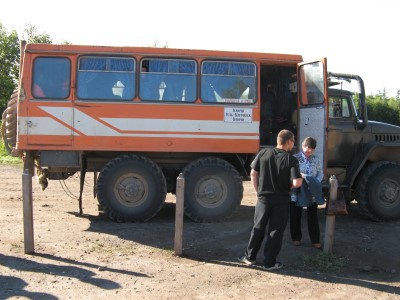
The
day began rather hectically, because we had
miscalculated how long we would need to get all of our gear to the bus.
Without
Slava’s talent for organization, we would have had a problem. But we
managed to
get there just on time. From Ust-Kamchatsk to Jelizovo was a 15 hour
journey.
Most of our luggage was in the aisle, so passengers had to climb over
it at
every stop. We arrived in Jelizovo at about eleven in the evening.
Luckily,
Martha picked us up in her van at the bus station. Thus we had managed
to
complete the second part of our trip on the Kamchatsk, from Kozyrevsk
to
Ust-Kamchatsk, successfully – with help and support from Slava. He
was just the
guide we had wanted and hoped for.
To the forth part of our Kamchatka trip - Hiking in the Nalycevo Nationalpark